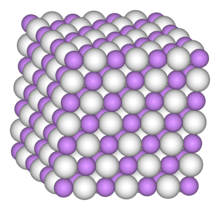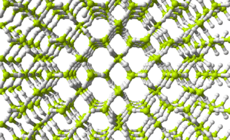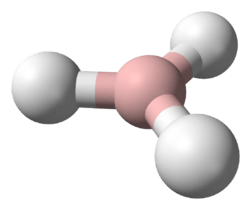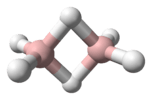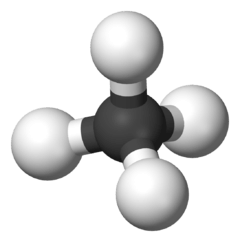Yttrium hydride
Yttrium hydride is a compound of hydrogen and yttrium. It is considered to be a part of the class of rare-earth metal hydrides. It exists in several forms, the most common being a metallic compound with formula YH2. YH2 has a face-centred cubic structure, and is a metallic compound. Under great pressure, extra hydrogen can combine to yield an insulator with a hexagonal structure, with a formula close to YH3.[1] Hexagonal YH3 has a band gap of 2.6 eV. Under pressure of 12 GPa YH3 transforms to an intermediate state, and when the pressure increases to 22 GPa another metallic face-centred cubic phase is formed.[2]
| Identifiers | |
|---|---|
| ChemSpider |
|
| EC Number |
|
PubChem CID |
|
Except where otherwise noted, data are given for materials in their standard state (at 25 °C [77 °F], 100 kPa). | |
| Infobox references | |
In 1996, it was shown that the metal-insulator transition when going from YH2 to YH3 can be used to change the optical state of windows from non-transparent to transparent.[3] This report spurred a wave of research on metal hydride-based chromogenic materials and smart windows; gasochromic windows reacting to hydrogen gas and electrochromic structures where the transparency can be regulated by applying an external voltage.[4] When containing a substantial amount of oxygen, yttrium hydride is also found to exhibit reversible photochromic properties.[5] This switchable optical property enables their utilization in many technological applications, such as sensors, goggles, and medical devices in addition to the smart windows. According to a research results, the strength of the photochromic response is found to decrease with increasing oxygen concentration in the film accompanied by an optical band gap widening. [6]
References
- Kume, Tetsuji; Ohura, Hiroyuki; Takeichi, Tomoo; Ohmura, Ayako; Machida, Akihiko; Watanuki, Tetsu; Aoki, Katsutoshi; Sasaki, Shigeo; Shimizu, Hiroyasu; Takemura, Kenichi (31 August 2011). "High-pressure study of ScH3: Raman, infrared, and visible absorption spectroscopy". Physical Review B. 84 (6): 064132. Bibcode:2011PhRvB..84f4132K. doi:10.1103/PhysRevB.84.064132.
- Machida, Akihiko (2007). "Unique Structures in Yttrium Trihydride at High Pressure" (PDF). Research Frontiers. SPring 8. pp. 58–59. Retrieved 1 December 2015.
- Huiberts, J. N.; Griessen, R.; Rector, J. H.; Wijngaarden, R. J.; Dekker, J. P.; de Groot, Koeman; N J (1996). "Yttrium and lanthanum hydride films with switchable optical properties". Nature. 380 (6571): 231. Bibcode:1996Natur.380..231H. doi:10.1038/380231a0.
- van der Sluis, P.; Mercier, V. M. M. (2001). "Solid state Gd-Mg electrochromic devices with ZrO2Hx electrolyte". Electrochimica Acta. 46 (13–14): 2167. doi:10.1016/S0013-4686(01)00375-9.
- Mongstad, T; Plazer-Björkman, C.; Maehlen, J. P.; Mooij, L.; Pivak, Y.; Dam, B.; Marstein, E.; Hauback, B.; Karazhanov, S. Zh. (2011). "A new thin film photochromic material: Oxygen-containing yttrium hydride". Solar Energy Materials and Solar Cells. 95 (12): 3596. arXiv:1109.2872. Bibcode:2011arXiv1109.2872M. doi:10.1016/j.solmat.2011.08.018.
- Moldarev, Dmitrii; Moro, Marcos V.; You, Chang C.; Baba, Elbruz M.; Karazhanov, Smagul Zh.; Wolff, Max; Primetzhofer, Daniel (2018-11-26). "Yttrium oxyhydrides for photochromic applications: Correlating composition and optical response". Physical Review Materials. 2 (11): 115203. doi:10.1103/PhysRevMaterials.2.115203.
